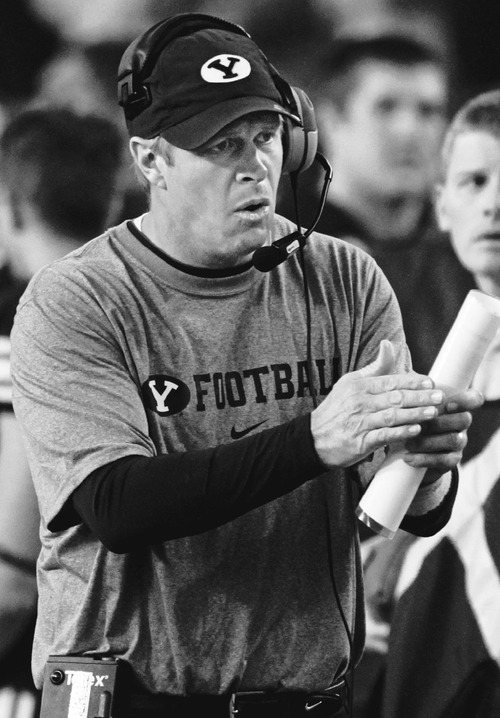This is an archived article that was published on sltrib.com in 2011, and information in the article may be outdated. It is provided only for personal research purposes and may not be reprinted.
Provo • Thanks to a two-year deal with the Western Athletic Conference, the power of ESPN and some timely luck, BYU's schedules as a football independent for the next two seasons are mostly set.
Generally, the schedules seem to be palatable for Cougar fans, given the circumstances, although this year's seven-game home schedule leaves much to be desired. Offsetting intriguing matchups with Utah, Central Florida and Utah State at LaVell Edwards Stadium during a 14-day stretch in September are duds against Idaho State, San Jose State, Idaho and New Mexico State the last two months of the season.
Conversely, the road schedule is difficult and interesting, with games at Ole Miss, Texas, Oregon State and Hawaii and a so-called neutral site matchup with TCU at Cowboys Stadium in Arlington.
Athletic director Tom Holmoe said in May that the process of finding 12 opponents per year the first two years, after having to find just four a year as a member of the Mountain West Conference, went more smoothly than even he anticipated.
The 2011 schedule has been set for six months. Holmoe said the 2012 schedule is missing just one opponent, but wouldn't name the two unknown opponents apparently already under contract.
Announced opponents on the 2012 docket include Oregon State, Hawaii, Utah, Boise State, Utah State, Georgia Tech, Notre Dame, New Mexico State and San Jose State.
But what happens in 2013 and beyond? What will BYU's schedule as an independent look like then?
"The first two years, it [was] going to be hard, because everybody already has their schedules [set]," Holmoe said. "… But if you are looking at 2013, 2014, 2015 or beyond, you have a wide-open schedule. You can get better teams."
Some sort of announcement regarding future opponents is expected Tuesday when Holmoe and head coach Bronco Mendenhall give their "state of the program" speeches during media day activities at the new broadcast center on campus. Dave Brown, ESPN vice president for programming and acquisitions, will also be in attendance.
The 2013 schedule already includes Utah, Texas, Hawaii, Boise State, Georgia Tech and Notre Dame. Asked in May if BYU will continue to play Utah State annually and whether those will be two-for-one arrangements or a home-and-home deals, Holmoe said, "We are working on all the possibilities."
In 2014, BYU will make return trips to Central Florida, Texas and Georgia Tech, and likely will play host to Notre Dame, although Holmoe said nothing is finalized with the six-game Notre Dame deal beyond the announcement that BYU will play in South Bend in 2012 and 2013.
BYU will play West Virginia at FedEx Field near Washington, D.C., in 2016.
Holmoe would not confirm or deny rumors last month that he has had preliminary scheduling talks with Navy, Wisconsin, Syracuse, Penn State, Nebraska, Ohio State, Washington State and Arizona State, among other schools. He hinted that several of those schools want two-for-one deals — playing at their stadiums twice and once at BYU.
"You will see [two-for-ones] with us, because we have the opportunity to do it," he said. "We have a wide-open schedule now, and we want to play those games. We have had schools say [they] will do a two-for-one, and I have said no — because it is not worth it. They are not a good enough team. I am not going to name names, but the ones that we are playing two-for-ones with, it is worth it for them to come to Provo for us to play a two-for-one."
Holmoe said he knew going in that finding opponents to play in November would be his greatest scheduling task, and that fear has already been realized. Some conferences won't allow their teams to schedule nonconference games in November.
"If there are big-time conferences that have policies like that, we are going to have to play them early," Holmoe said. "That's one of the hard things about [independence]. If they stay strong on that [policy] for years, it is going to make it difficult for us to play stronger teams later in the season."
Holmoe said that's where the eight-year deal with ESPN can really help BYU.
"We have an opportunity to get them on TV," he said. "TV likes nonconference games, even later in the schedule. They love great matchups between conferences. I think people have to realize that individual schools will go, 'We have an opportunity to play in November, let's do it.' "
Twitter: @drewjay —
BYU's known football opponents beyond 2012 season
2013 • Texas, Hawaii, *Utah, Boise State, Georgia Tech, Notre Dame
2014 • Central Florida, Texas, Boise State, Utah, Georgia Tech, **Notre Dame, ***Hawaii
2015 • Boise State, Utah, Hawaii
2016 • West Virginia, Utah, Hawaii
2017 • Georgia Tech, Utah, Hawaii
* BYU and Utah have only officially agreed to play in Provo in 2011 and Salt Lake City in 2012, though both athletic directors have said the series will continue indefinitely.
** Notre Dame and BYU will play six times before 2020, but only the 2012 and 2013 games in South Bend, Ind., are finalized.
*** BYU and Hawaii have signed a long-term contract that could include as many as nine matchups through 2020, but only the 2011, 2012 and 2013 games are already scheduled.



